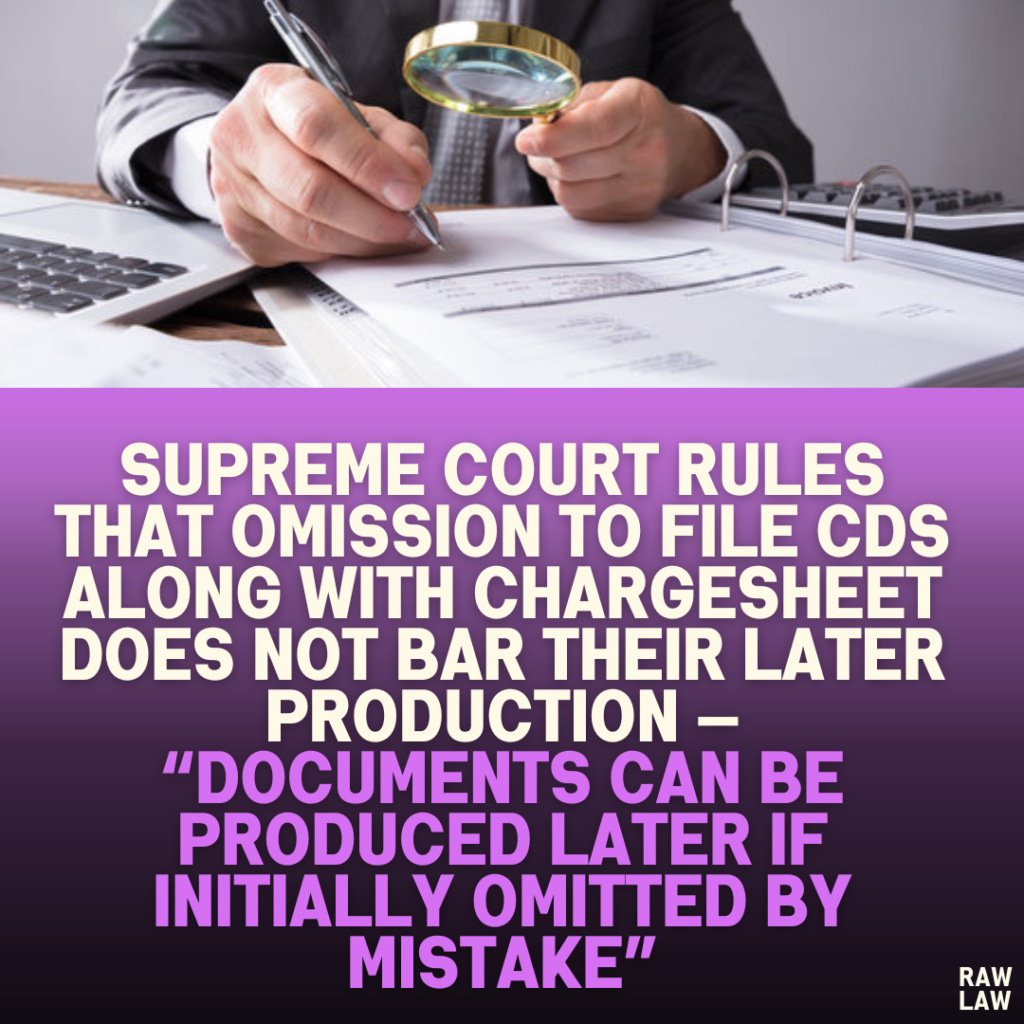Court’s Decision
The Supreme Court dismissed the criminal appeals and upheld the Delhi High Court’s decision allowing the Central Bureau of Investigation (CBI) to place on record two CDs containing intercepted telephonic conversations. The Court held that:
“Applying the law laid down in the case of R.S. Pai, the impugned judgments of the Special Court and the High Court cannot be faulted.”
The Court clarified that the prosecution can be allowed to produce documents or material omitted from the chargesheet if the omission was inadvertent and no prejudice is caused to the accused. However, the Court expressly kept open the issue of authenticity and admissibility of the CDs under Section 65B of the Indian Evidence Act.
Facts
- The appellant (Accused No. 7) is facing trial for offences under Section 120-B IPC and Sections 7, 8, 9, and 10 of the Prevention of Corruption Act, 1988.
- Between January and May 2013, the Ministry of Home Affairs permitted the interception of telephone calls of several accused.
- On May 4 and May 10, 2013, two CDs containing intercepted calls were seized.
- These CDs were sent to the Central Forensic Science Laboratory (CFSL) on May 27, 2013.
- A chargesheet was filed on July 2, 2013; however, the CFSL report was received later on October 25, 2013.
- A supplementary chargesheet, including the CFSL report and Section 65B certificate, was filed on October 30, 2013, but the CDs themselves were inadvertently not filed.
- The prosecution later sought to play the CDs during the trial, leading to objections.
- The appellant challenged the admissibility of the CDs, ultimately resulting in a petition before the Supreme Court.
Issues
- Whether the CDs, which were in possession of the prosecution at the time of filing the chargesheet, could be placed on record at a later stage.
- Whether Section 173(5) CrPC is mandatory or directory in requiring all documents to be submitted with the chargesheet.
- Whether the subsequent production of CDs causes prejudice to the accused.
Petitioner’s Arguments
- The CDs were available before filing the original chargesheet and hence could not be introduced later unless through further investigation under Section 173(8) CrPC.
- The law mandates that only new material obtained during further investigation can be added, not pre-existing evidence.
- The petitioner relied on the decisions in Mariam Fasihuddin v. State, Sidhartha Vashisht v. State (NCT), and V.K. Sasikala v. State, asserting that rights under Section 207 CrPC are mandatory.
- The petitioner urged reconsideration of the precedent in R.S. Pai, arguing that it wrongly interpreted Section 173(5) CrPC as directory.
Respondent’s Arguments
- The CDs were seized and sent for analysis before the filing of the chargesheet, but the CFSL report was not available at that time.
- The supplementary chargesheet filed later contained the CFSL report but inadvertently omitted the CDs.
- There was no prejudice to the appellant since the CDs were already referenced and accompanied by a Section 65B certificate.
- The prosecution emphasized that R.S. Pai is still binding and does not require reconsideration.
Analysis of the Law
- The Court relied heavily on the precedent set in CBI v. R.S. Pai, which interpreted Section 173(5) CrPC as directory and not mandatory.
- It reiterated that inadvertent omission does not preclude the production of documents at a later stage, provided the court grants permission.
- The decision in Mariam Fasihuddin was found to not depart from R.S. Pai, as it dealt with a situation involving no new material during further investigation.
Precedent Analysis
- CBI v. R.S. Pai (2002) 5 SCC 82: Held that additional documents omitted by mistake can be produced later with court permission.
- Arjun Panditrao Khotkar v. Kailash Kushanrao Gorantyal (2020) 7 SCC 1: Reaffirmed the principle in R.S. Pai and emphasized that no serious prejudice should result to the accused.
- Mariam Fasihuddin v. State (2024 SCC OnLine SC 58): Addressed the meaning of “further investigation” but did not overrule R.S. Pai.
- Sidhartha Vashisht v. State (2010) 6 SCC 1 and V.K. Sasikala v. State (2012) 9 SCC 771: Dealt with the accused’s right to documents under Section 207 CrPC, which was found to be inapplicable in the present case.
Court’s Reasoning
- The CDs were explicitly referred to in the supplementary chargesheet and were sent for forensic analysis before the first chargesheet was filed.
- The failure to annex the CDs was inadvertent and did not indicate an attempt to fill lacunae.
- Allowing the production of the CDs would not prejudice the accused as they retain the right to challenge their authenticity and cross-examine prosecution witnesses.
- The Court criticized the High Court’s remarks on the authenticity of the CDs, stating that such determinations should be made during trial, not at the pre-trial stage.
Conclusion
- The Supreme Court upheld the High Court’s decision allowing the CDs to be placed on record.
- However, it clarified that the issues of:
- Whether the CDs produced were the same as those seized,
- The validity of the Section 65B certificate,
- And the authenticity and admissibility of the CDs,
- The appellant may recall prosecution witnesses for limited cross-examination regarding the CDs.
Implications
- Reinforces the directory nature of Section 173(5) CrPC regarding filing of documents with chargesheet.
- Reaffirms the right of the prosecution to correct inadvertent omissions without violating the rights of the accused.
- Emphasizes that issues of authenticity, especially concerning electronic evidence, must be resolved during trial, not at the preliminary stage.
- Strengthens prosecutorial flexibility while safeguarding fair trial rights.




Pingback: Supreme Court Bars Attempt to Delay Execution in Specific Performance Suit—"When a Party Is Impleaded as a Legal Heir Under Order XXII Rule 4 Without Objection, They Cannot Seek Deletion Under Order I Rule 10; Barred by Res Judicata" - Raw Law